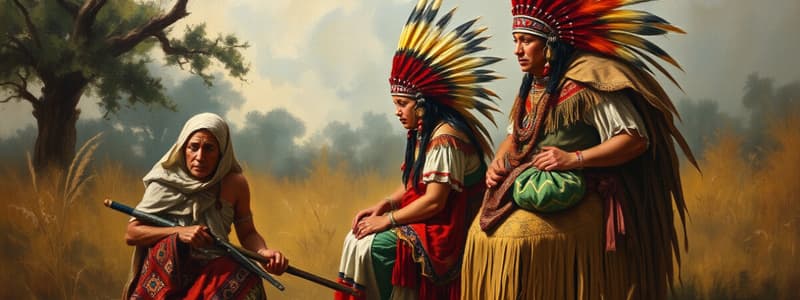Podcast
Questions and Answers
What type of homes did the Karankawa live in?
What type of homes did the Karankawa live in?
- Tipis
- Apartment-like buildings
- Cone-shaped huts
- Round houses (correct)
What food sources did the Caddo rely on?
What food sources did the Caddo rely on?
Corn, deer, beans, buffalo, pumpkins, fishing, sunflowers, salt
The Tonkawa lived in sedentary villages.
The Tonkawa lived in sedentary villages.
True (A)
The Apache, Wichita, Kiowa, and Comanche were ____ people that followed their food source.
The Apache, Wichita, Kiowa, and Comanche were ____ people that followed their food source.
Which of the following is a characteristic of the Jumano?
Which of the following is a characteristic of the Jumano?
What did the nomadic tribes typically use buffalo hide for?
What did the nomadic tribes typically use buffalo hide for?
Match the Native American tribes with their characteristics:
Match the Native American tribes with their characteristics:
Flashcards are hidden until you start studying
Study Notes
Karankawa
- Lifestyle involved mobility with easy-to-move round houses.
- Nomadic hunters utilized dogs for transportation.
- Diet included fish, turtles, lizards, oysters, grasshoppers, deer, rabbits, plants, and cactus.
- Used shark oil as a natural mosquito repellent.
- Engaged in weaving their own clothing.
Coahuiltecan
- Relied on a diet of deer, beans, corn, buffalo, pumpkins, sunflowers, and salt.
- Developed sedentary villages characterized by tall, cone-shaped huts, furnished with rooms.
- Utilized dogs for carrying possessions.
- Structured as a matrilineal society.
- Known for craftsmanship in basketry and pottery, using both plant and animal hides.
Caddo
- Primarily engaged in agriculture, cultivating corn and beans, along with hunting deer and buffalo.
- Constructed elaborate settlements with cone-shaped huts.
- Maintained a matrilineal social structure.
- Produced pottery and woven goods, showcasing cultural sophistication.
Tonkawa
- Depended on buffalo, berries, deer, fish, and various fruits and nuts.
- Lived in tipis and beehive-shaped wickiups as mobile dwellings.
- Renowned as expert horsemen, following bison herds for sustenance.
- Adapted clothing from buffalo hides.
Apache, Wichita, Kiowa, Comanche
- Share a diet rich in buffalo, berries, deer, fish, fruits, and nuts.
- Followed a nomadic lifestyle in search of food sources.
- Built tipis and wickiups for shelter.
- Mastered horsemanship and relied on buffalo hide for clothing.
Tigua
- Harvested crops such as corn, beans, and squash, along with deer, antelope, and berries.
- Constructed apartment-like adobe brick buildings for habitation.
- Artisans in pottery production, emphasizing their cultural heritage.
- Matrilineal society highlighted by distinctive striped facial markings.
- Engaged in trade with surrounding cultures, fostering economic connections.
Jumano
- Sustained themselves on corn, beans, squash, deer, antelope, bear, and berries.
- Built multi-family apartment-like dwellings from adobe.
- Known for their pottery and intricate designs.
- Organized as a matrilineal society, indicating importance of maternal lineage.
- Established trade networks with diverse cultures, enhancing their social and economic status.
Studying That Suits You
Use AI to generate personalized quizzes and flashcards to suit your learning preferences.



